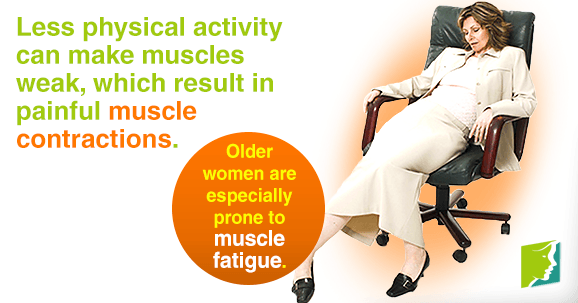Fatigue is a feeling of constant exhaustion, which often does not go away with either sleep or rest. Possible symptoms include heavy eyelids, lack of motivation, a feeling of irritability, and difficulty concentrating. Although the condition can affect anybody, it seems that women are generally more susceptible than men. Fatigue can also cause problems with muscle contraction, and this is termed “muscle fatigue”. Read on to learn more about fatigue, muscle fatigue, and the link between them.
Causes of Fatigue
Fatigue can actually be a symptom of an underlying disorder, such as:
Celiac disease
This disease is an autoimmune condition involving a reaction to the consumption of gluten. In people with this disease, gluten causes the body to mistakenly attack healthy tissue, as constituents in the substance are interpreted as a threat. The resulting effect on the bowel means that nutrients are not efficiently absorbed, so the body is not getting the energy it needs, even if the person is eating well.
Iron deficiency anemia
Lack of iron is one of the most common causes of fatigue. This type of anemia leads to a lack of production of red blood cells, so oxygen cannot be efficiently transported to all the major organs. This lack of oxygen is what causes the crushing feeling of tiredness. Classic indications of iron deficiency anemia are lack of motivation and heavy muscles.
What Is Muscle Fatigue?
Muscle fatigue is a lack of power in the muscles, meaning they cannot generate much force. This can make simple tasks - like lifting something up or getting out of a chair - difficult and tiring. The causes of muscle fatigue are often linked to general fatigue, but it does have some causes of its own too, as outlined below.
Causes of Muscle Fatigue
These causes may make muscle contraction more work therefore resulting in fatigue.
Hormonal factors
Muscle fatigue has a lot to do with loss of muscle mass, and estrogen has a large role to play in muscle mass. Therefore, as this hormone fluctuates during certain times in a woman's life (pregnancy, menstruation, and menopause ), muscle fatigue can occur. Older women are especially prone to muscle fatigue, with studies showing that, on average, there is a 0.6% annual decline in muscle mass after menopause.
Oxidative stress
Free radicals are reactive substances that damage parts of cells, and are often blamed for causing the aging process. In younger women and women with a diet full of antioxidants like vitamin C, the body is much better equipped to cope with healing the damage done by the free radicals and ridding the body of them. Age and certain lifestyle factors mean that muscles can be damaged by free radicals and the body is unable to repair them, leading to weakness.
The Link
Muscles need to be moved to build strength, and as fatigue will generally result in people doing less physical activity than normal, muscles can begin to weaken as a result. This can lead to painful muscle contractions. In addition, muscle fatigue can make movement of the muscles incredibly difficult, so exerting force can be incredibly tiring. This in itself can cause overall physical and mental fatigue, as the thought of carrying out simple tasks becomes more and more daunting.
Fatigue and muscle contractions are often interlinked, although many people do have one without the other. The causes of fatigue and muscle fatigue are numerous, and this article is by no means an exhaustive list, but it does give some of the common reasons for the conditions. Seeing a doctor as soon as symptoms begin to arise is the best way to know if your fatigue or muscle fatigue is indicative of an underlying illness.
There are also natural ways to face muscle fatigue, follow the link below to learn more.
Sources
- Betteridge, D.J. (2000). What is oxidative stress? Metabolism, 49(2 Suppl 1), 3-8. Retrieved September 11, 2014 from http://www.ncbi.nlm.nih.gov/pubmed/10693912
- International Society of Musculoskeletal and Neuronal Interactions. (2009). Changes in muscle mass and strength after menopause. Retrieved September 11, 2014, from http://www.ismni.org/jmni/pdf/38/02MALTAIS.pdf
- National Health Service UK. (2013). 10 medical reasons for feeling tired. Retrieved September 11, 2014, from http://www.nhs.uk/Livewell/tiredness-and-fatigue/Pages/medical-causes-of-tiredness.aspx
- National Health Service UK. (2013). Chronic fatigue syndrome - Treatment. Retrieved September 11, 2014, from http://www.nhs.uk/Conditions/Chronic-fatigue-syndrome/Pages/Treatment.aspx
- National Health Service UK. (2014). Coeliac disease. Retrieved September 11, 2014, from http://www.nhs.uk/conditions/Coeliac-disease/Pages/Introduction.aspx
- National Health Service UK. (2014). Iron deficiency anaemia. Retrieved September 11, 2014, from http://www.nhs.uk/conditions/Anaemia-iron-deficiency-/Pages/Introduction.aspx




